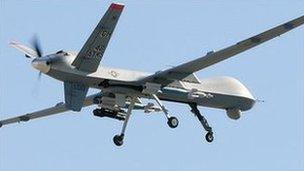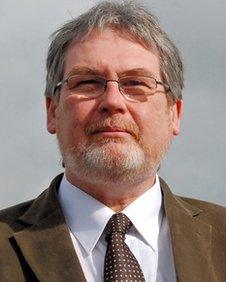Chapel leaders oppose drone tests over Wales in Christmas message
- Published

Unmanned aerial vehicles can be used for military and non-military purposes
A group of 450 chapels has used its Christmas message to condemn testing of unmanned aircraft over parts of Wales.
The Union of Welsh Independent Churches claim "the spirit of Herod is still at work", saying children had been killed by drone strikes in Pakistan and Gaza.
General Secretary the Revd Dr Geraint Tudur said they prayed for peace and reconciliation rather than war.
The Ministry of Defence said it only used such craft in Afghanistan, mainly for intelligence gathering and unarmed.
In July, an air exclusion zone for the testing and demonstrating of unmanned aircraft was extended and made permanent between QinetiQ's testing base at Aberporth, Ceredigion, and Epynt, in the Brecon Beacons.
Business Minister Edwina Hart described it as a significant step forward in support for an emerging technology sector, while QinetiQ said unmanned aircraft had a variety of non-military uses.
But CND Cymru said many people were "deeply concerned" about the work, a view echoed in the chapel leaders' Christmas message.
'Another way'

Dr Geraint Tudur said the chapels were concerned about the killing of innocent people in drone strikes
"As a union, we are appalled that military drones are allowed to fly in airspace over south Wales between Aberporth and Mynydd Epynt," said Dr Tudur.
"We must challenge the spirit of Herod by objecting to this new weapon, like every other weapon, which is being used to kill people in other countries - including civilians and innocent children," he added.
He went on to say that it was tragic that "humankind continues to turn to war and violence", praying that people recognised "the way of peace and reconciliation" as another way.
In response, a spokesperson for the Ministry of Defence said: "We only deploy unmanned aircraft (UAS) in Afghanistan and in the vast majority of cases these are used to provide front line troops with vital intelligence and surveillance information, helping to save the lives of both civilians and coalition forces.
"On the rare occasions that weapons are used, the trained operators controlling the aircraft take every possible measure to avoid civilian casualties."
In recent months, US forces have used drones to attack militants in Pakistan, Yemen and Somalia, prompting concern about civilian casualties.
- Published16 June 2011